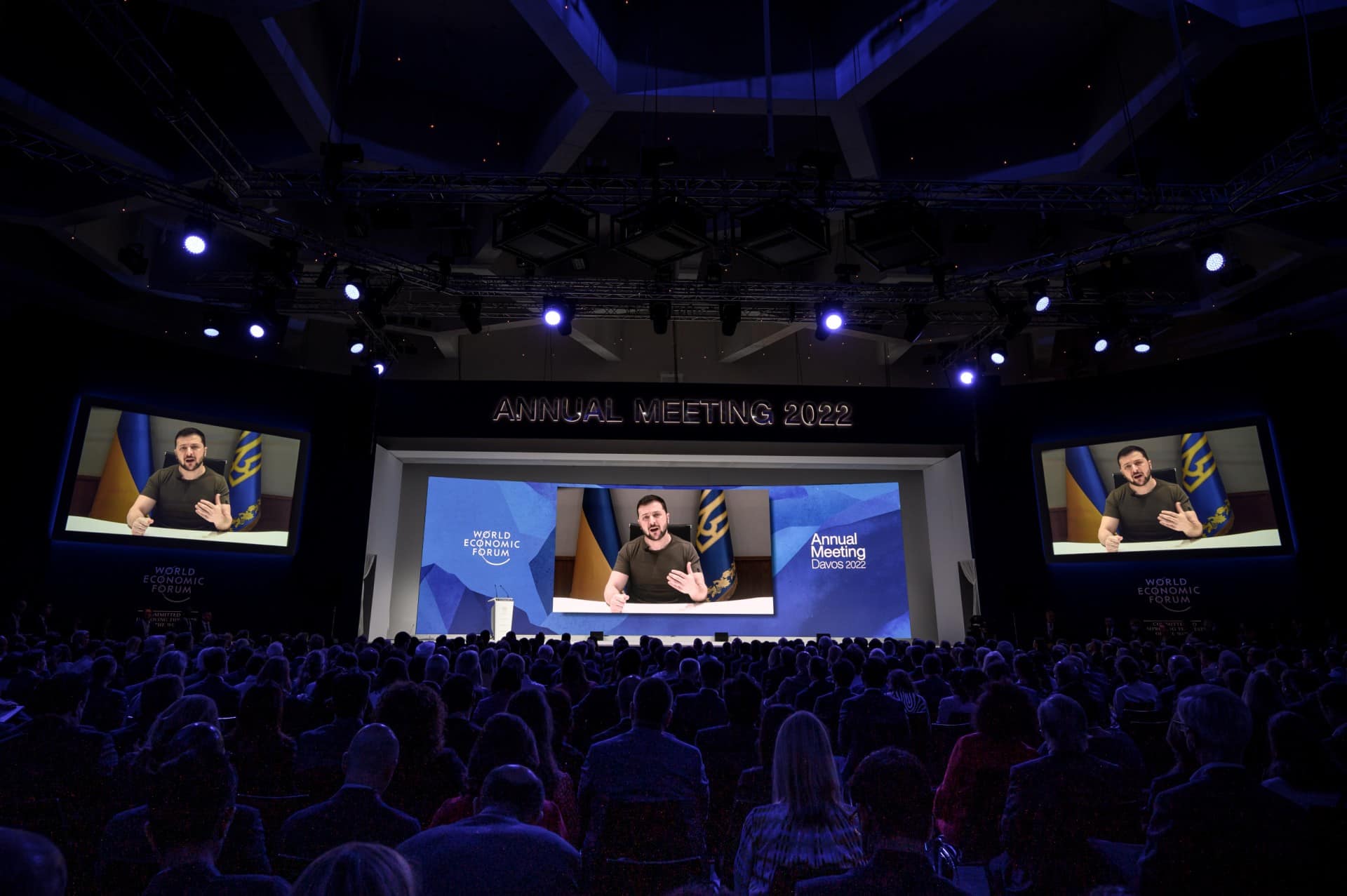Ukrainian President Volodymyr Zelensky used the Davos summit Monday to appeal for more weapons and “maximum” sanctions against Russia, lamenting that tens of thousands of lives would have been saved had countries acted faster.
Appearing by video link, Zelensky delivered the headline speech to the first World Economic Forum to be held in the Swiss Alps in more than two years after the Covid pandemic derailed the event.
The conflict shows “that support to the country under attack is more valuable the sooner it is provided: weapons, funding, political support and sanctions against Russia,” said Zelensky, who received a standing ovation.
“If we would have received them by 100 percent of ours needs at once back in February, the result would have been tens of thousands of lives saved,” said Zelensky, flanked by Ukrainian flags and wearing an olive-green T-shirt.
“This is why Ukraine needs all the weapons that we ask for, not just the ones that have been provided,” he said, adding that 87 people were killed in a May 17 Russian strike on a military base in northern Ukraine.
Anastasia Radina, a Ukrainian lawmaker, told AFP that her country needs “NATO-style” weapons including tanks and ground-based air defence systems.
“What we are looking for most importantly are fighter jets and this has been the most difficult discussion,” she said.
“Three months into the war, and tens of thousands lives lost, we are still at the point of discussing if we need fighter jets. Frankly speaking this is outrageous.”
Ukraine is receiving howitzers “but that is not yet enough,” she said.
End all Russia trade
Zelensky called for an oil embargo on Russia, punitive measures against all its banks and the shunning of its IT sector, adding that all foreign companies should leave the country.
“There should not be any trade with Russia,” he told the gathering.
“I believe there are still no such sanctions against Russia — and there should be.”
While the United States, Britain and Canada have moved to ban Russian oil and gas, the European Union has been divided over imposing similar measures. EU members such as Germany and Hungary are heavily dependent on energy supplies from Russia.
WEF Klaus Schwab praised Zelensky for his “courageous leadership” and said Davos participants were eager to hear how they could assist Ukraine “because everybody is affected by what’s happening in your country.”
The war is dominating the four-day meeting of the world’s business and political elites, with Ukraine sending a strong contingent of officials, including the foreign minister, to plead for more aid.
Russian business and political leaders, who used to participate in debates and mingle with other A-listers at champagne parties, were barred by organisers from attending this year’s gathering over the war.
The Ukrainians have transformed the “Russia House” in Davos –- normally used by the Russian delegation — into the “Russia War Crimes House” to promote their cause.
More than 50 heads of state or government are among the 2,500 delegates at the WEF under the title “History at a Turning Point”.
Some of the biggest names include Germany’s new chancellor, Olaf Scholz, European Union chief Ursula von der Leyen, NATO head Jens Stoltenberg and US climate envoy John Kerry.
‘Bonanza’ for billionaires
When the WEF last took place in Davos in January 2020, the coronavirus was just brewing in China before morphing into a devastating pandemic.
A Davos forum took place virtually last year, with Russian President Vladimir Putin among the speakers.
While the summit is back, it lacks its usual snowy backdrop after the Omicron variant forced this year’s January meeting to be postponed until now. Instead, rain is forecast all week.
Climate change and concerns about the economic recovery from the pandemic are also at the forefront of the Davos talks.
Inflation has become a major concern as energy and food prices have soared further since Russia invaded Ukraine, raising fears of hunger in countries dependent on wheat from the region.
Global charity Oxfam warned that 263 million people could sink into extreme poverty this year, at a rate of one million every 33 hours.
By contrast, 573 new billionaires have emerged during the pandemic, or one every 30 hours.
“Billionaires are arriving in Davos to celebrate an incredible surge in their fortunes,” Oxfam executive director Gabriela Bucher said in a statement.
“The pandemic and now the steep increases in food and energy prices have, simply put, been a bonanza for them,” Bucher said.








